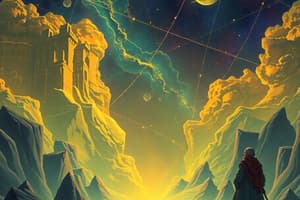Podcast
Questions and Answers
What is the fundamental reason for the existence of economic questions?
What is the fundamental reason for the existence of economic questions?
- Resources are abundant and evenly distributed.
- Human wants exceed the resources available to satisfy them. (correct)
- Economists prefer to complicate simple issues.
- Human desires are completely satisfied.
Which statement best describes the role of economists as social scientists?
Which statement best describes the role of economists as social scientists?
- They provide insights into human behavior and resource allocation. (correct)
- They focus exclusively on market trends.
- They primarily advise governments on cultural issues.
- They predict economic outcomes without data.
How does the economic way of thinking manifest in everyday life?
How does the economic way of thinking manifest in everyday life?
- By assuming all problems have a financial solution.
- By evaluating trade-offs and opportunity costs. (correct)
- By ignoring resource limitations.
- By focusing solely on individual desires.
In what way is economics considered a useful job skill?
In what way is economics considered a useful job skill?
What is one of the key questions that economists strive to answer?
What is one of the key questions that economists strive to answer?
Flashcards
Economics Definition
Economics Definition
Economics studies how people use limited resources to satisfy unlimited wants.
Economic Questions
Economic Questions
Economists answer questions about how best to allocate resources to meet human needs.
Economic Way of Thinking
Economic Way of Thinking
A set of principles that guides economic analysis, often emphasizing trade-offs and marginal changes.
Economics as a Social Science
Economics as a Social Science
Signup and view all the flashcards
Economics as a Life Skill
Economics as a Life Skill
Signup and view all the flashcards
Study Notes
Essential Foundations of Economics
- This is the ninth edition of the textbook.
- The book is authored by Bade and Parkin.
Getting Started
- After completing the chapter, students will be able to define economics and understand the questions economists ask.
- Students will grasp the fundamental economic way of thinking.
- Students will learn how economists work as social scientists and policy advisors.
- Students will understand how economics provides skills for life and careers.
1.1 Definitions and Questions
- Economic problems arise because human wants exceed available resources (scarcity).
- Scarcity necessitates choices among available alternatives.
- Decisions depend on the incentives faced.
- Economics is the social science that studies choices made by individuals, businesses, and governments in the face of scarcity. Choices are influenced by incentives, and coordinated by arrangements.
- Economics is divided into two branches: microeconomics and macroeconomics.
Microeconomics
- Focuses on individual choices and businesses
- Explores how those choices interact and are affected by the government.
Macroeconomics
- Focuses on the aggregate (overall) effects of individual, business, and government choices on national and global economies.
Two Big Economic Questions
- How do choices determine what, how, and for whom goods and services are produced?
- When are choices made in self-interest also in the social interest?
What, How, and For Whom?
- Goods and services (objects and actions) are valued and produced to meet human wants.
- What goods and services are produced, and in what quantities?
- How are goods and services produced?
- For whom are the goods and services produced?
Can the Pursuit of Self-Interest Be in the Social Interest?
- Choices best for an individual are made in self-interest.
- Choices best for society as a whole are made in social interest.
Globalization
- Expansion of trade and production by global firms in different countries.
- Globalization increased due to cheaper communication costs.
The Information Revolution
- Makers of computer chips and programs developed products in their self-interest, but did they develop them in the social interest?
Climate Change
- Choices about energy production and use are made in self-interest.
- Do these choices also benefit the social interest?
Government Budget Deficit and Debt
- Since 2000, the U.S. government has consistently spent more than it collected in taxes.
- This has resulted in increasing national debt.
- Rising retirement and healthcare costs are contributing to the problem.
- Who is responsible for repaying these debts?
1.2 The Economic Way of Thinking
- Choice is a trade-off
- Cost is what you give up to get something
- Benefit is what you gain from something
- Choices are rational when beneficial cost comparisons are made.
- Most choices involve incremental changes (marginal choices)
- Incentives affect choices
A Choice Is a Trade-off
- Scarcity forces choices from alternatives.
- Every choice means giving up an alternative.
- Trade-offs are exchanges; giving something up to gain something else.
Cost: What You Must Give Up
- Opportunity cost is the highest-valued alternative forgone.
Benefit: What You Gain
- Benefit is the gain or satisfaction from something.
- Benefit is measured by how much someone is willing to give up.
Rational Choice
- Using available resources to best achieve a goal.
- Involves comparisons of costs and benefits.
How Much? Choosing at the Margin
- Choices are made incrementally by comparing relevant alternatives.
Marginal Cost
- Opportunity cost of a one-unit increase in an activity.
- What is given up to get an additional unit of something.
Marginal Benefit
- Gain from getting one additional unit of something.
- What someone is willing to give up to get an extra unit.
Making a Rational Choice
- A rational choice occurs when the marginal benefit exceeds or equals the marginal cost.
Choices Respond to Incentives
- Incentives (rewards or penalties) influence decisions.
1.3 Economics as a Social Science and Policy Tool
- Economists use the scientific method to understand and predict economic effects.
- The method involves questions, models, and testing.
- Economic models describe the economy, focusing on crucial components.
- Predictions from models are checked against the facts.
Economic Models
- Economists create models to answer questions about the economy.
- Models include only essential details.
Check Predictions of Models Against Facts
- Predictions are checked against real economic events.
Natural Experiments
- Factors causing a change in the economy can be different for certain circumstances.
Statistical Investigations
- Correlation of variables in the economy.
Economic Experiments
- Economists observe real people in decision-making contexts to understand their responses to specific factors.
Disagreement: Normative versus Positive
- Economists sometimes disagree about policies.
- Normative statements make judgments about what ought to be.
- Positive statements explain what is.
Economics as a Policy Tool
- Policy questions often have a mix of positive and normative elements.
- Economics provides ways to evaluate options and find the most effective use of resources.
1.4 Economics as a Life Skill and Job Skill
- Economics degrees lead to various career paths, including advanced degrees like Master’s or Ph.D.
- Jobs for economics majors include market research analysts, financial analysts, and budget analysts.
- Earning potential varies, but averages are relatively good.
- Economists need critical thinking, analytical, math, writing, and communication skills.
Economics for Life
- The skills learned apply to various life scenarios.
- Examples of economic decisions (student loans, business competition, global trade regulations, charitable donations).
Eye on the Benefit and Cost of School
- School benefits include enjoyment of student life and higher future income.
- School costs include tuition, books, other expenses, and forgone earnings.
- For most people, the net benefit of attending school outweighs the costs.
Studying That Suits You
Use AI to generate personalized quizzes and flashcards to suit your learning preferences.




